Israel strikes Iran-linked targets in Damascus for second day in a row
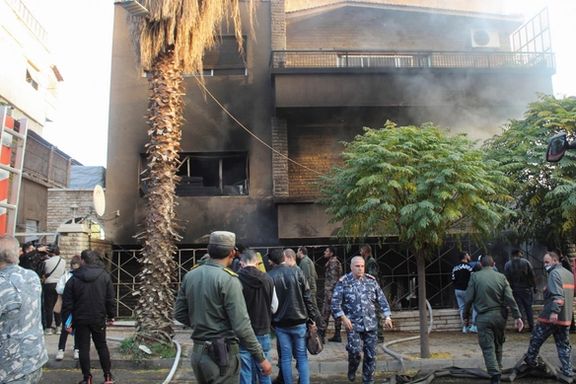
Israeli airstrikes targeted the Mazzeh suburb of Damascus on Friday, intensifying an air campaign against Iran-linked targets in Syria.

Israeli airstrikes targeted the Mazzeh suburb of Damascus on Friday, intensifying an air campaign against Iran-linked targets in Syria.
Explosions which Syrian state news agency SANA said were Israeli airstrikes hit the Mazzeh area for the second day in a row and appeared to target personnel from Hezbollah and Iran's Revolutionary Guards, as well as leaders from Palestinian groups like Hamas and Islamic Jihad.
While the specific targets of Friday’s strikes remain unclear, they follow a pattern of escalating action against Iran and its allies.
On Thursday, similar strikes in Mazzeh and nearby Qudsaya claimed fifteen lives, targeting military sites and Islamic Jihad’s headquarters.
The airstrikes occurred shortly before Ali Larijani, a senior adviser to Iran’s Supreme Leader Ali Khamenei, was scheduled to meet with Palestinian representatives at the Iranian Embassy in Mazzeh.
The escalation in Syria reflects a broader regional dynamic. On Tuesday, the United States conducted successive airstrikes on Iranian-backed militia facilities in eastern Syria in retaliation for attacks on US personnel.
These strikes, combined with the Pentagon’s deployment of additional air and naval assets to the region, indicate increasing US involvement in countering Iranian allies.
Simultaneously, Israeli forces expanded their operations beyond Damascus, targeting strategic infrastructure along the Syrian-Lebanese border. A bridge near Qusayr in Homs was destroyed to disrupt weapons transfers to Hezbollah, further intensifying pressure on Iranian-aligned groups.
While Israel has long carried out airstrikes on Iran-linked targets in Syria, the frequency and intensity of these operations have grown significantly since the October 7 attack by the Palestinian group Hamas last year, which triggered the Gaza war.
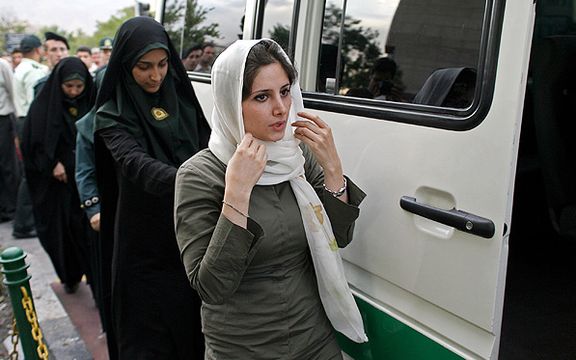
Iran's President and Parliament Speaker appear to have put the brakes on the enforcement of the ultra-hardliners’ controversial Hijab Act by refraining from officially communicating it to the government for implementation.
The enforcement of the legislation, which imposes harsh penalties—including heavy fines and prison sentences—on women for not adhering to strict hijab regulations and on businesses for failing to enforce them, could be highly provocative under the current circumstances and risk igniting anti-government protests.
The legislation must have been sent to the President within five days of its approval by the ultra-hardline Guardian Council in late September to sign and communicate to all government bodies.
The finalization of the legislation, which seemed deliberately delayed during Ebrahim Raisi's presidency to avoid a popular backlash and shield his government from vulnerability, was completed shortly after the new administration took office. This move has largely been interpreted as a direct challenge to Pezeshkian and his administration, who promised to adopt a softer stance toward hijab violations.
Normally, as seen under previous presidents, the Parliament Speaker would send the new law to government agencies within three days if the president chose not to.
However, neither Masoud Pezeshkian, who vowed to prevent violence and pressure on women over hijab, nor Mohammad-Bagher Ghalibaf, who has consistently supported hijab restrictions, has taken this step or provided any explanation.
In the past few days, ultra-hardliners have taken new steps to keep the hijab issue alive and push the government to enforce the legislation including an announcement about a “clinic” in Tehran to rehabilitate women who flout the mandatory hijab.
The state hijab enforcement enity, Amr-e be Marouf Headquarters, is headed by Kazem Sediqqi, one of Tehran’s several interim Friday imams. The imams are considered appointees of the Supreme Leader Ali Khamenei.
The establishment of the ‘hijab rehabilitation clinic’ is meant to prevent Pezeshkian’s government from easing hijab enforcement, veteran politician Mohammad Tavassoli, the former leader of the reformist Iran Freedom Movement (Nehzat-e Azadi) contended in a tweet.
Government officials have denied having any part or knowledge of the facility's establishment.
The official, Mehri Talebi-Darestani, defined the mission of the “clinic” as offering “scientific and psychological treatment” to women to bring them to voluntarily abide by the Islamic dress code.
While she described visits to the “clinic” as “optional,” a senior official from the same state body revealed in an interview with a news website that participation in these rehabilitation programs would be offered as an alternative to the cash fines imposed on women by the courts.
Social media users, the "reformist" media, and mental health professionals have widely criticized the move.
In a joint statement Wednesday, the Iranian Psychological Association and Psychotherapy Associations condemned ultra-hardliners’ new move.
The use of the words “clinic” and “rehabilitation” suggests that not abiding by the prescribed Islamic dress code is a mental disorder or illness, the statement said, adding that they considered it a “clear example of misapplication of psychology and psychiatry.”
“You can mock this hijab rehabilitation clinic now but you will find out what they have in store for the nation when they drag people there, make up a record of mental illness for them, as well as a lot of financial costs,” a critic tweeted while warning Pezeshkian to be wary of the consequences of hardliners new plan.
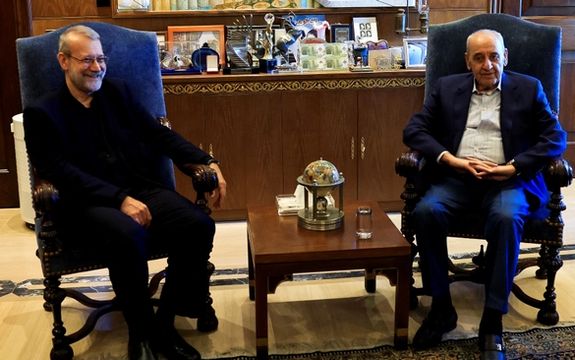
A senior Iranian official in a visit to Beirut blessed efforts to reach a US-mediated ceasefire between Israel and Hezbollah, in one of the clearest signs yet Tehran wants to wrap up a year of conflict there.
Ali Larijani is a personal envoy of Iran's Supreme Leader Ali Khamenei and his meetings with senior Lebanese officials come as the United States has stepped up efforts toward a ceasefire.
Larijani told reporters his presence was not aimed at obstructing that initiative.
"We are not looking to sabotage anything. We are after a solution to the problems," he said. "We support in all circumstances the Lebanese government."
Larijani met with Lebanese caretaker Prime Minister Najib Mikati and Hezbollah-aligned Parliament Speaker Nabih Berri to discuss a ceasefire, according to a tweet from the Iranian Embassy in Lebanon.
Larijani also carried a personal message from the Supreme Leader to Berri, according to Iranian state media, the contents of which were not disclosed.
Mikati, speaking on the same day, stressed Lebanon’s commitment to fully implementing United Nations Security Council Resolution 1701 without amendments. The resolution, adopted to end the conflict between Hezbollah and Israel in 2006, calls for southern Lebanon to remain free of weapons outside state control.
Currently, a US-brokered proposal is under discussion that would require Hezbollah to relocate its forces and weapons north of the Litani River, about 18 miles from the Israeli border, according to the Wall Street Journal.
The Lebanese military and United Nations peacekeepers would be tasked with preventing the group’s return. Israeli Strategic Affairs Minister Ron Dermer briefed Donald Trump on the plan at Mar-a-Lago, with Trump endorsing the proposal and expressing hope for its implementation before his inauguration on January 20.
Meanwhile, Iran appears to be extending an olive branch—or at least a strategic handshake—on multiple fronts. Last month, the Speaker of Iran’s Parliament indicated Tehran’s willingness to negotiate with France to implement UN resolutions concerning southern Lebanon.
On Thursday, Iranian President Mohammad Pezeshkian expressed Iran’s willingness to cooperate with the International Atomic Energy Agency (IAEA) to address questions about its nuclear program.
A senior Iranian official said that Tehran would send a message to three European powers through visiting IAEA Chief Rafael Grossi emphasizing Iran’s seriousness about resolving its nuclear standoff with the West, Reuters reported Thursday.

Iranian officials have so far remained silent on reports that Elon Musk, a Trump team insider, met with Tehran’s ambassador to the UN. However, some state-controlled media outlets have described the meeting as potentially beneficial.
The New York Times reported on Thursday that Musk had a secret meeting with Amir Saeid Iravani in New York. Two Iranian officials speaking with the newspaper described the meeting as “positive” and “good news.”
Neither Elon Musk nor President-elect Donald Trump’s team has denied the report, suggesting it may represent an initial step by the incoming administration to establish contacts and engage with the Islamic Republic. This development comes despite widespread expectations that Trump will adopt a hardline approach toward Tehran, for example allowing Israel to launch more direct strikes.
Faced with the dual threats of aggressive Israeli actions and the election of Donald Trump, Tehran has been signaling its willingness to show flexibility, as reflected in statements by Foreign Minister Abbas Araghchi throughout the week. However, the IRGC has maintained its hardline rhetoric.
After the news about Musk’s meeting in New York, the conservative website Nameh News in Tehran expressed optimism that Trump has changed and is willing to compromise.
“An early and direct meeting between a senior Iranian official and Elon Musk hints at the possibility of negotiations and a potential agreement on the horizon. It appears that Trump has genuinely decided to adopt a different approach toward Iran, perhaps, as Abbas Araghchi put it, moving from 'maximum pressure' to 'maximum rationality,'” the website argued in an article on Friday.
Some Iran watchers on social media warned that Tehran is playing its old and tested method of enticing the United States with the prospect of negotiations and an agreement, trying to buy time to outlast the Trump administration.
Iran nuclear program analyst Andrea Stricker, from the Foundation for Defense of Democracies—a think tank critical of the Islamic Republic—tweeted a message directed at Musk, stating, “Don’t lay the groundwork for a bad deal with Iran. Tehran’s goal is simply to outlast Trump while preserving its nuclear capabilities.”
Others expressed doubt about the accuracy of the NYT report, questioning if Musk would meet with an Iranian official. An Iranian-American activist tweeted that "The more I learn about the 'meeting' between Elon Musk and Amir Saeid Iravani the more questions I have. The story that broke has IRI propaganda written all over it."
Another Tehran website quoted an analyst who said that goodwill by individuals such as Musk are not enough to bring about a serious change. Trump needs to form dedicated teams to draft negotiating positions regarding outstanding issue.
Although during his campaign Trump emphasized that he would not allow Iran to acquire nuclear weapons, this is not the only major issue in potential discussions between the two countries. Iran's regional policies and its support for anti-Israel militant groups represent another Gordian knot that an Israel-friendly administration needs to address.
For now, Iran’s diplomats and civilian officials have stopped threatening a retaliatory missile attack on Israel for the October 26 air strikes that targeted Iranian military sites. But the IRGC and its supporters still renew the threat.
On Thursday, former IRGC commander Mohsen Rezaei warned that Iran is preparing the retaliation. Earlier in the day, Army Commander-in-Chief Abdolrahim Mousavi said, Iran would “choose the timing and nature of our response to the Zionist regime, and when the moment arrives, we will act without hesitation," adding that "Our response will be decisive and uncompromising.”
Other senior IRGC officials intensified their warnings. Islamic Revolutionary Guard Corps Chief Hossein Salami said Iran was determined to respond.
“Our eyes are fixed upon you, and we will fight to the very end. Retribution will come; we will respond with painful blows—just wait and see,” Salami warned.
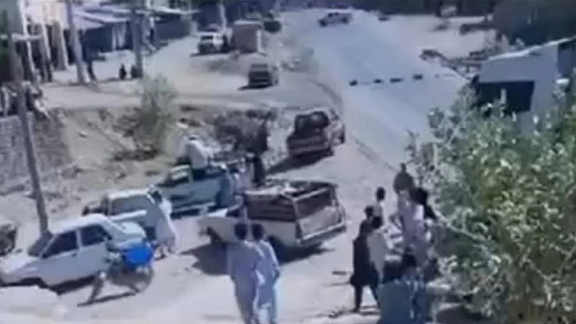
Three IRGC officers and four assailants were killed, while six others were arrested, in an attack that took place during a military operations in Iran’s Sistan-Baluchestan province on Thursday.
Hours after the attack, Jaish al-Adl, a Sunni Baloch insurgent group, released a statement claiming that its operatives had engaged in direct clashes with IRGC special forces and intelligence units in the Jalalabad area of Sarbaz County.
The IRGC said that its forces were conducting drills in the province’s southern region near the Pakistani border, aimed at enhancing security. It pledged to continue operations until all objectives are achieved. However, it appears that government forces are engaged in anti-insurgency operations, rather than drills.
The attack is part of escalating violence in the region. Earlier this week, militants killed five IRGC Basij forces in a border outpost attack in Saravan, near the Iranian-Pakistani border. Governor Mansour Bijar identified the victims as local Baloch Sunni Muslims and said the attackers came from a neighboring country.
Last week, Jaish al-Adl killed an IRGC officer in the same area during clashes that also left four of their members dead and three civilians injured. Hours after Friday’s attack, Jaish al-Adl claimed responsibility, stating that their fighters had clashed with IRGC special forces and intelligence agents in the Jalalabad area of Sarbaz County.
The United Nations Security Council condemned the Jaish al-Adl attacks, calling them "cowardly terrorist acts." The group seeks an independent Baluchistan, uniting Baluch communities on both sides of the Iran-Pakistan border, and has a long history of ambushes, bombings, and raids in southeastern Iran. Their operations frequently target Iranian security forces and have caused numerous military and civilian casualties.
Iran's Sistan-Baluchestan province has long been a hotspot for violence, frequently targeted by Jaish al-Adl, a militant group with a history of ambushes, bombings, and other armed operations that have claimed the lives of both civilians and security forces.
The group has orchestrated numerous attacks in southeastern Iran, further destabilizing an already volatile region. The Baluch are one of the poorest ethnic groups in Iran, suffering from lack of decent public services and infrastructure.
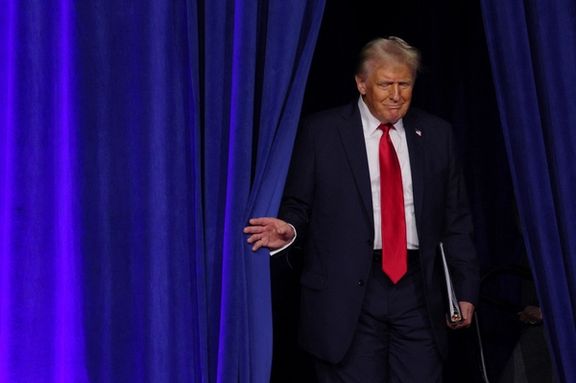
In the week since Donald Trump won the US election, Iran’s president Masoud Pezeshkian and his foreign policy chiefs have talked about the importance of engaging with Washington. Their wording may vary, but the message is one: that tensions with the US must be managed.
Pezeshkian, his right-hand man Javad Zarif, and Iran’s foreign minister Abbas Araghchi appear to have recognized that the era of American leniency toward Tehran under president Joe Biden is nearing its end.
In most countries, comments from a president and a foreign minister would be the ultimate reflection of that state’s foreign policy. Not in Iran.
On the biggest and most consequential questions in Tehran—whether or not to attack Israel, whether or not to support Hezbollah, whether or not to move toward nuclear weaponization, and of course, whether or not to talk to the Americans—on all these questions, Pezeshkian and his team hold little or now sway.
Their role is to present a civilized, more relatable face to the outside world. But the real face of power in the Islamic Republic is the supreme leader Ali Khamenei and the commanders of the Islamic Revolutionary Guard Corps (IRGC), who can hardly be clearer when voicing their anti-American and anti-Israeli agenda.
A few days ago, FM Araghchi suggested on X that US president-elect Donald Trump should adopt “Maximum Rationality" instead of returning to his “Maximum Pressure”, which in the eyes of Araghchi will lead to “Maximum Defeat” for America.
The irony of Iran calling for rational behavior aside, it seems unlikely that Trump would heed Araghchi’s advice or pay particular attention to similar comments from Zarif and Pezeshkian. The president-elect is much more likely to take note of Tehran’s attempt to hurt American interests and alleged attempts to assassinate him.
President Biden was relatively lenient in dealing with Iran. His team tried not to aggravate the ayatollahs and prevent an all-out war in the Middle East. This approach made Iran more aggressive, in fact. Regional armed groups aligned with the IRGC were emboldened..
Thus, it seems unlikely that the Iranian charm offensive, spearheaded by Araghchi, will alter the incoming Trump administration’s hawkish approach against the Islamic Republic. It’s also unlikely that Trump will engage in direct confrontation with Iran early in his term.
The president-elect said during his campaign that all he wants from Iran is not to make a nuclear weapon. It cannot be ruled out that he offers broader talks that include not just Iran’s nuclear program but missile capabilities. The latter is something Khamenei and IRGC commanders are unlikely to entertain.
The complicating factor in all this is that Tehran is closer to a nuclear weapon than it has ever been. And it has been suggesting for some time that it might reconsider its long-standing position against weaponization.
It’s hard to tell if this is just a bluff or a serious threat. Given Trump’s clear message about a nuclear Iran, and glancing over what Israel has been willing to do across the Middle East in the past year, Khamenei would be risking all if he were to follow with that threat.